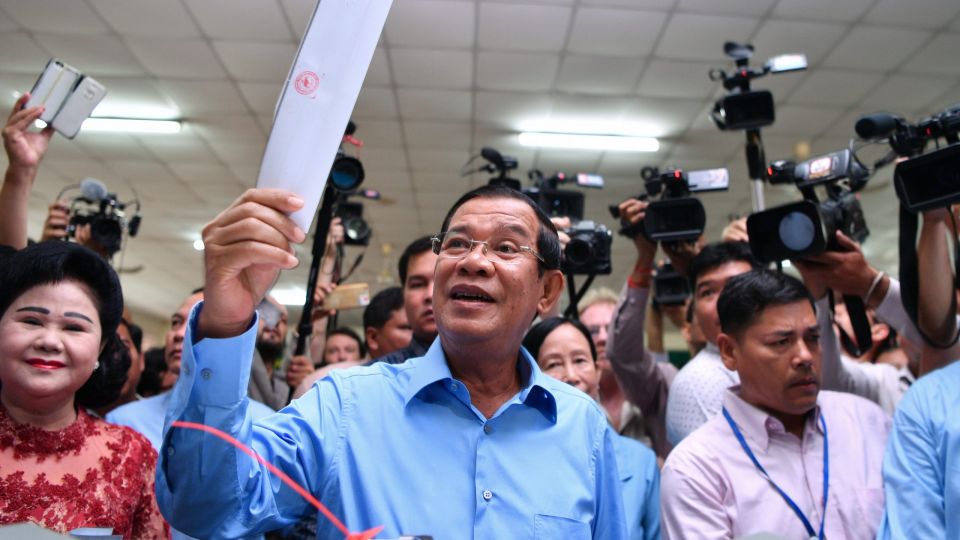October 14, 2019
The ‘crunch diplomacy mission’ will decide Cambodia’s Everything But Arms (EBA) trade agreement.
Prime Minister Hun Sen left for Europe on Sunday as he embarked on a five-day diplomatic visit to three EU countries, in a trip analysts have speculated could be crucial in deciding the Kingdom’s ‘Everything But Arms’ (EBA) fate.
According to a Ministry of Foreign Affairs and International Cooperation press release, Hun Sen is set to visit the Czech Republic, Hungary and Bulgaria between Sunday and Thursday this week.
He will be accompanied by Minister of Foreign Affairs and International Cooperation Prak Sokhonn, Minister of Commerce Pan Sorasak, Minister of Water Resources and Meteorology Lim Kean Hor and Minister of Tourism Thong Khon.
The prime minister is set to meet with Czech Senate President Jaroslav Kubera, before having a closed-door bilateral meeting with Prime Minister Andrej Babis to discuss bilateral cooperation, the press release said.
“Both prime ministers will exchange views on regional and international issues of common interest. Thereafter, they will witness the signing of a number of documents on bilateral cooperation and hold a joint press conference,” it said.
Hun Sen is also set to attend the third Budapest Water Summit in Hungary on Tuesday under the theme Preventing Water Crises.
He will address the summit’s opening session focusing on Cambodia’s priorities, strategies and programmes to achieve effective and sustainable water resource management and development in the Kingdom.
“His remarks will address the need for shared efforts in water security and environmental sustainability, as well as other challenges such as global warming, the increase in the world’s population and conflicts over transboundary water use,” the ministry’s statement said.
The prime minister will also meet with Hungarian President Janos Ader, as well as have a separate meeting with Li Yong, the director-general of the UN Industrial Development Organisation.
Hun Sen is set to spend Tuesday and Wednesday in Bulgaria, where he will meet with President Rumen Radev and Prime Minister Boyko Borissov.
The two prime ministers are set to discuss bilateral relations, regional and international issues of mutual interest, as well as witness the signing of several bilateral cooperation documents.
Ministry spokesperson Ket Saphann declined to comment on what documents would be signed during the trip, saying their exact nature would be announced later.
Kin Phea, the director-general of the International Relations Institute at the Royal Academy of Cambodia, said the Kingdom has historically enjoyed good relations with the Czech Republic, Hungary and Bulgaria.
“Historically, Cambodia and these three countries have close ties and support each other as they and the Kingdom have all experienced having embargoes imposed on them. I believe this trip will strengthen already good relations,” Phea said.
He also said good relations with these three countries will help improve relations between the Kingdom and the EU, and potentially prove beneficial in the Kingdom retaining its access under the bloc’s EBA agreement.
Cambodia’s EBA access – which sees lower tariffs placed on the vast majority of the Kingdom’s exports to the 28-member bloc, worth some $5.8 billion last year – is currently under review.
The Kingdom is currently under a monitoring period, with the European Commission set to present its final report in November.
A final decision on whether to fully or partially remove EBA or maintain the status quo will be made in February 2020. And if a suspension is decided, it will come into effect by August 2020.
Phea said that Hungary, Bulgaria and the Czech Republic had already expressed their support for Cambodia on the matter.
“In the context of multilateral relations between Cambodia and the EU, the three countries can voice their defence of Cambodia regarding EBA to the European Commission and the EU parliament,” he said.
Political analyst Lao Mong Hay said a consensus was needed among all EU members to remove Cambodia’s access to EBA.
“Any of the three countries the prime minister is visiting may block its [the EU’s] pending decision to withdraw EBA. They [the Czech Republic, Hungary or Bulgaria] can veto such a decision, if EBA is an EU foreign policy issue,” he said.
Currently, all EU foreign policy decisions are decided by unanimous vote, as opposed to majority vote, with each member state effectively holding veto power over any decision.


